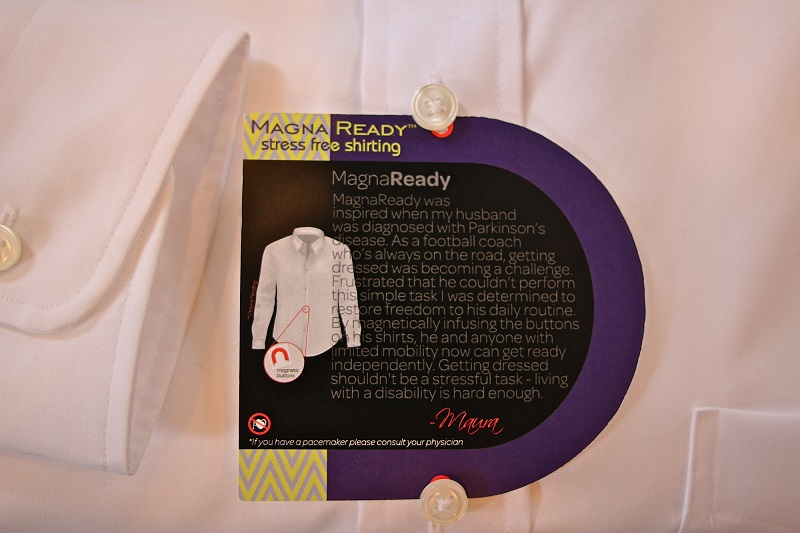By Jane Applegate
A new men’s shirt company is trying to tap into the nearly $3 billion U.S. market for dress shirts with innovative designs and practical fasteners.
Its timing is good: men today are buying more shirts with collars and cuffs, according to NPD Group, a market research firm. In fact, NPD reports that sales in the men’s dress shirt category jumped 13.49% to $2.78 billion in the 12-month period ending Nov. 30, 2012. That’s compared with a 2.26% increase in the overall men’s shirt and sweater business during the same period.
 Maura Horton, a children’s clothing designer, told me she put her skills to work when her husband Don, was having trouble buttoning his shirts. Horton, who has Parkinson’s disease, needed an easy-to-button dress shirt while working as an offensive coach for North Carolina State University. (He’s no longer coaching the university team).
Maura Horton, a children’s clothing designer, told me she put her skills to work when her husband Don, was having trouble buttoning his shirts. Horton, who has Parkinson’s disease, needed an easy-to-button dress shirt while working as an offensive coach for North Carolina State University. (He’s no longer coaching the university team).
After buying and trying out a few poor quality shirts with Velcro® fasteners, Maura Horton got busy designing a high-quality, 100 percent cotton, no-iron dress shirt that fastens with tiny magnets hidden in a French placket. The MagnaReady shirts, which sell for $59.99, are designed to solve a big problem for men with a variety of health challenges.
Once she perfected the design, she searched on Alibaba.com to find magnet manufacturers in China. “It took six months to get the molds made right,” says Horton. “We found that when you coated the magnets in plastic (to make them waterproof), it reduced the strength of the magnet.”
Once she had the magnets in production, she found a shirt manufacturer willing to make the shirts. South Carolina-based Overton Apparel makes MagnaReady shirts in a factory in Honduras.
“My husband was my test model,” says Horton. Now, however, he can’t wear the magnetic shirts because he’s had brain surgery to alleviate his symptoms and has a pacemaker.
Still, her husband’s challenge was the inspiration for the new family business. Now, she plans to expand by adding a line of kids’ coats with magnetic fasteners.
Like most entrepreneurs, her biggest challenge was finding the money to start the business. She actually pitched her magnetic shirt concept and made it to the finals on Shark Tank, the hit show where entrepreneurs try to attract investors.
Although she didn’t find an investor on the show, the process led her to a private investor who has a family member with multiple sclerosis. The investor, who she declined to identify, invested under $1 million to help her develop the shirts and pay the cost of filing for a patent on the design.
So far, Horton and her investor have spent under $200,000 to get the business off the ground. “My dream is to sell the shirts in retail stores,” says Horton. “Retailers have not done their homework. They have big sections of ‘plus size’ clothing, but nothing for customers with disabilities. I guess disability clothing is not sexy enough, but it should have its own department.”
Jane Applegate is the author of four books on small business success, including 201 Great Ideas for Your Small Business, (Bloomberg/Wiley). She’s the founder of TheApplegateNetwork.com and co-founder of FabulousFemaleNetwork.com.







